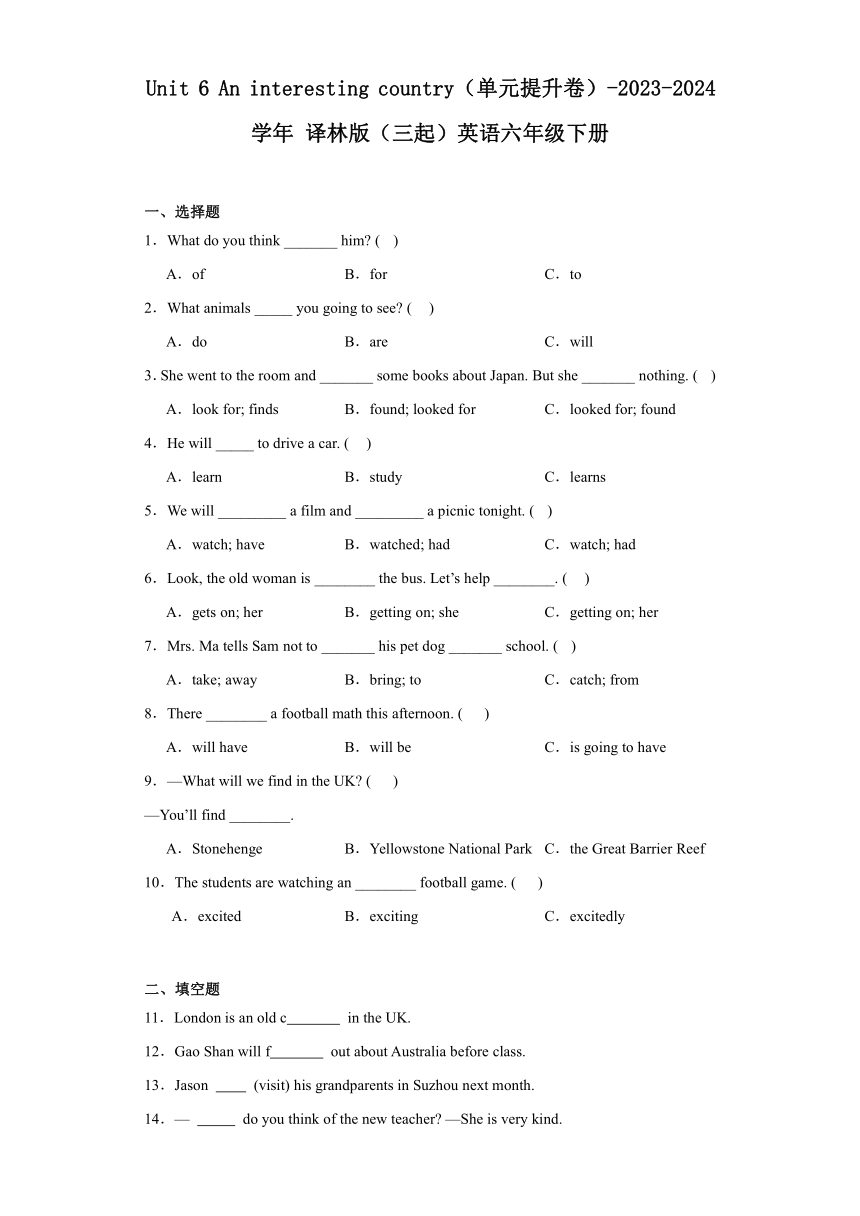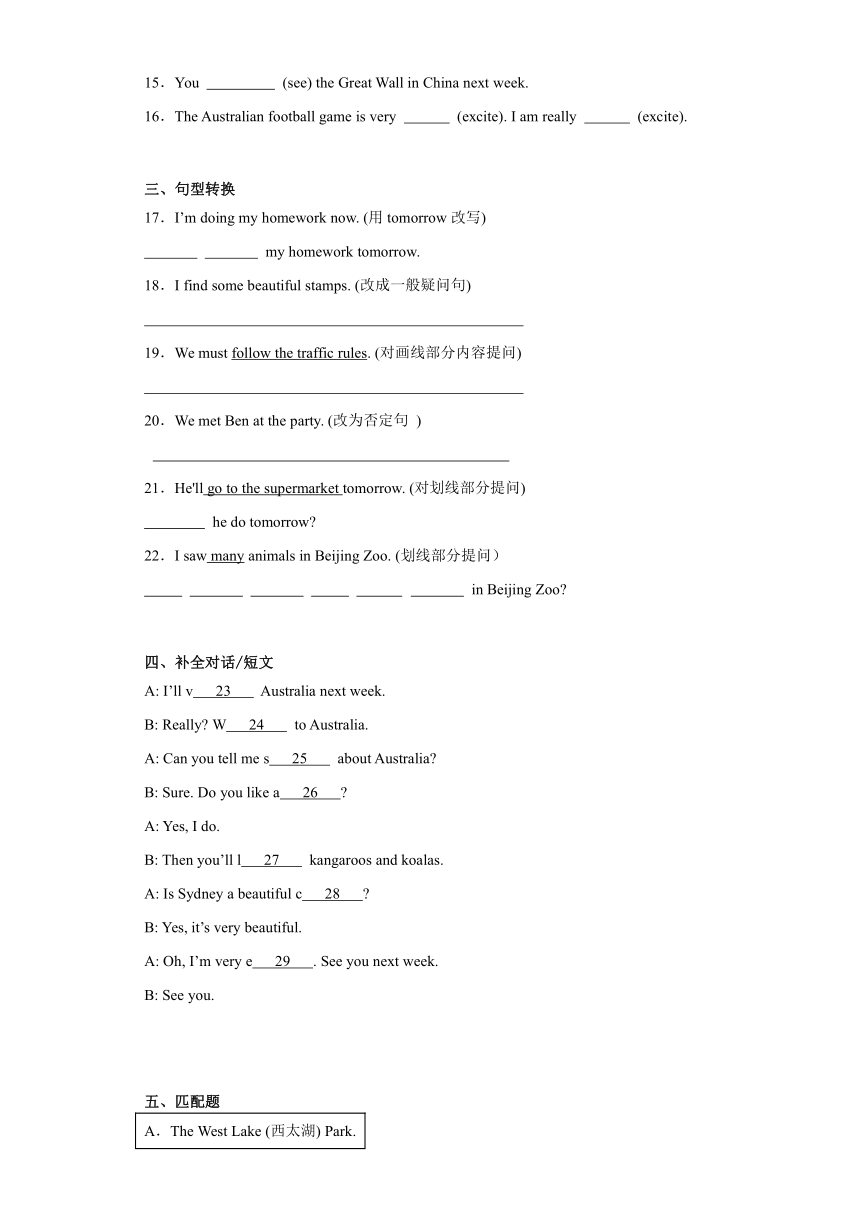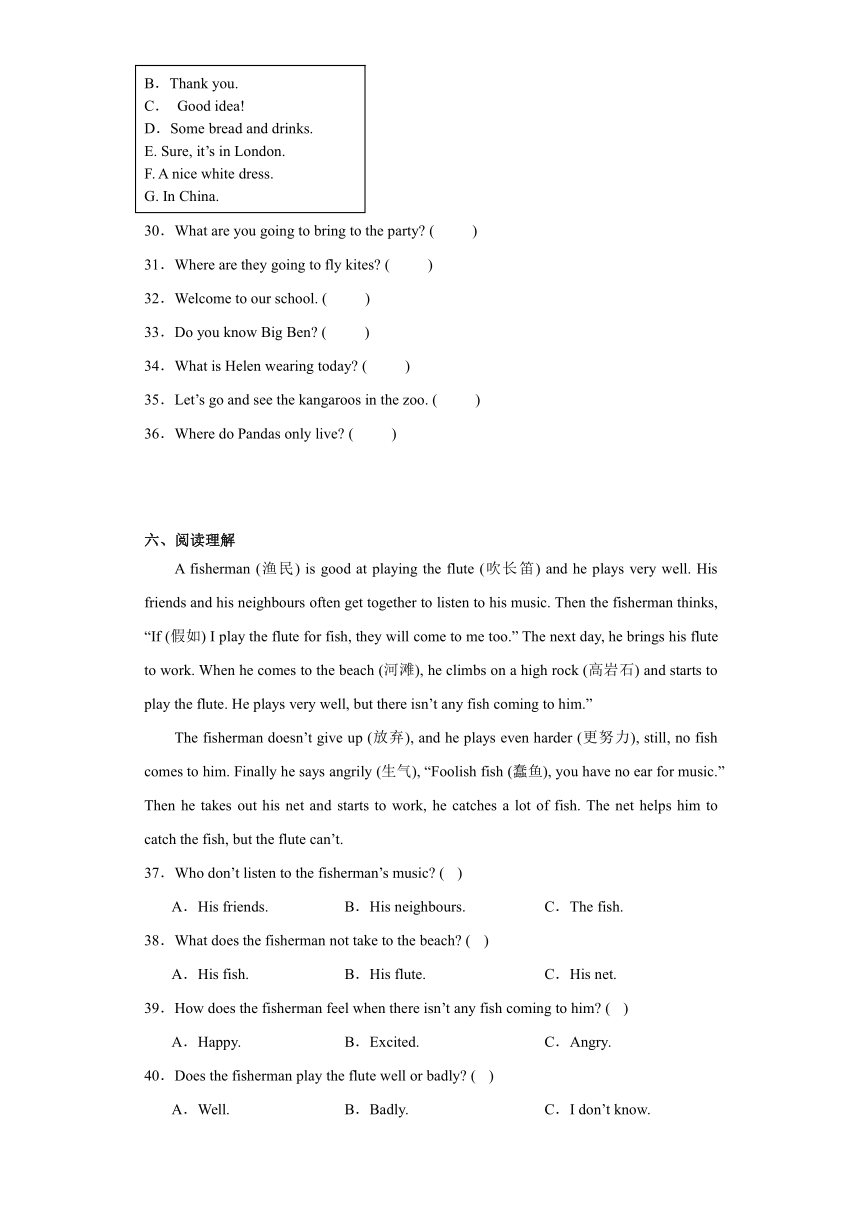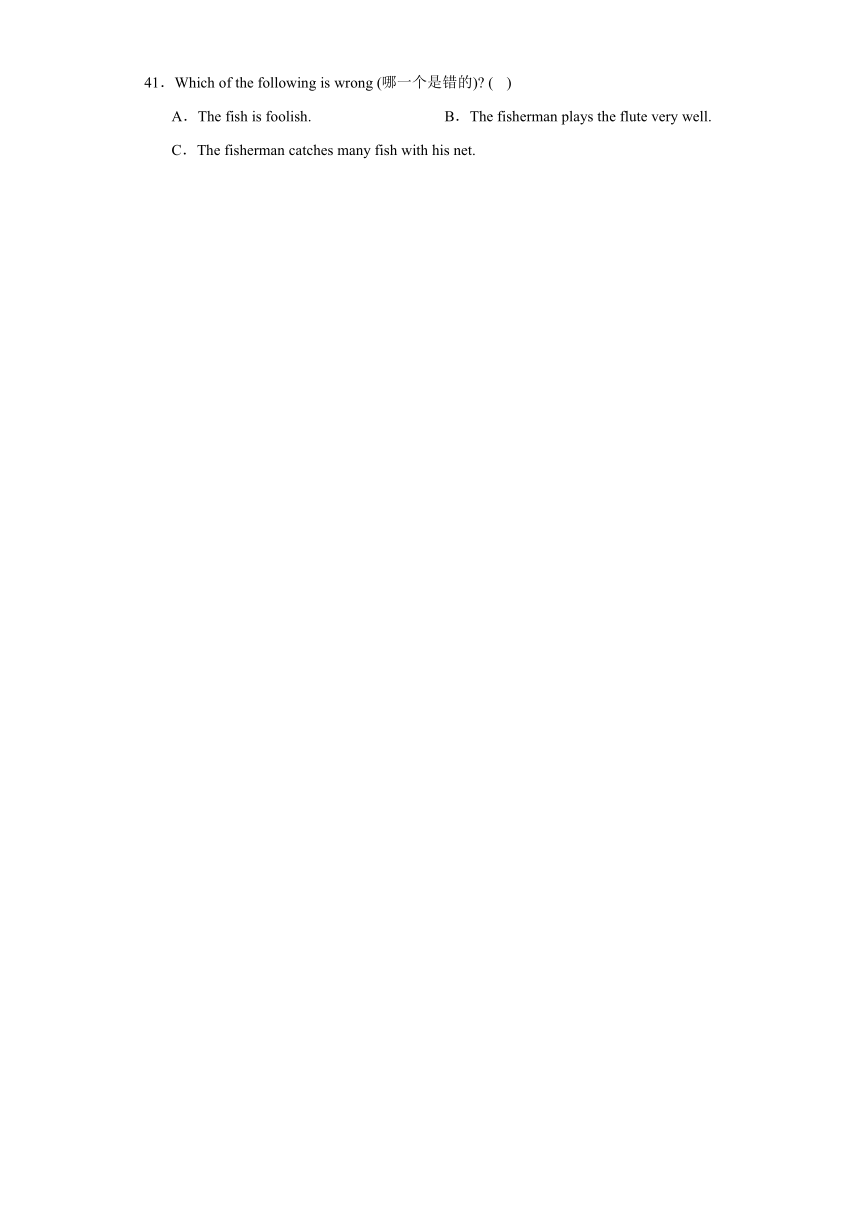Unit 6 An interesting country 单元提升卷(含解析)
文档属性
| 名称 | Unit 6 An interesting country 单元提升卷(含解析) |  | |
| 格式 | docx | ||
| 文件大小 | 28.2KB | ||
| 资源类型 | 教案 | ||
| 版本资源 | 牛津译林版 | ||
| 科目 | 英语 | ||
| 更新时间 | 2024-02-04 16:10:24 | ||
图片预览




文档简介
Unit 6 An interesting country(单元提升卷)-2023-2024学年 译林版(三起)英语六年级下册
一、选择题
1.What do you think _______ him ( )
A.of B.for C.to
2.What animals _____ you going to see ( )
A.do B.are C.will
3.She went to the room and _______ some books about Japan. But she _______ nothing. ( )
A.look for; finds B.found; looked for C.looked for; found
4.He will _____ to drive a car. ( )
A.learn B.study C.learns
5.We will _________ a film and _________ a picnic tonight. ( )
A.watch; have B.watched; had C.watch; had
6.Look, the old woman is ________ the bus. Let’s help ________. ( )
A.gets on; her B.getting on; she C.getting on; her
7.Mrs. Ma tells Sam not to _______ his pet dog _______ school. ( )
A.take; away B.bring; to C.catch; from
8.There ________ a football math this afternoon. ( )
A.will have B.will be C.is going to have
9.—What will we find in the UK ( )
—You’ll find ________.
A.Stonehenge B.Yellowstone National Park C.the Great Barrier Reef
10.The students are watching an ________ football game. ( )
A.excited B.exciting C.excitedly
二、填空题
11.London is an old c in the UK.
12.Gao Shan will f out about Australia before class.
13.Jason (visit) his grandparents in Suzhou next month.
14.— do you think of the new teacher —She is very kind.
15.You (see) the Great Wall in China next week.
16.The Australian football game is very (excite). I am really (excite).
三、句型转换
17.I’m doing my homework now. (用tomorrow改写)
my homework tomorrow.
18.I find some beautiful stamps. (改成一般疑问句)
19.We must follow the traffic rules. (对画线部分内容提问)
20.We met Ben at the party. (改为否定句 )
21.He'll go to the supermarket tomorrow. (对划线部分提问)
he do tomorrow
22.I saw many animals in Beijing Zoo. (划线部分提问)
in Beijing Zoo
四、补全对话/短文
A: I’ll v 23 Australia next week.
B: Really W 24 to Australia.
A: Can you tell me s 25 about Australia
B: Sure. Do you like a 26
A: Yes, I do.
B: Then you’ll l 27 kangaroos and koalas.
A: Is Sydney a beautiful c 28
B: Yes, it’s very beautiful.
A: Oh, I’m very e 29 . See you next week.
B: See you.
五、匹配题
A.The West Lake (西太湖) Park. B.Thank you. C. Good idea! D.Some bread and drinks. E. Sure, it’s in London. F. A nice white dress. G. In China.
30.What are you going to bring to the party ( )
31.Where are they going to fly kites ( )
32.Welcome to our school. ( )
33.Do you know Big Ben ( )
34.What is Helen wearing today ( )
35.Let’s go and see the kangaroos in the zoo. ( )
36.Where do Pandas only live ( )
六、阅读理解
A fisherman (渔民) is good at playing the flute (吹长笛) and he plays very well. His friends and his neighbours often get together to listen to his music. Then the fisherman thinks, “If (假如) I play the flute for fish, they will come to me too.” The next day, he brings his flute to work. When he comes to the beach (河滩), he climbs on a high rock (高岩石) and starts to play the flute. He plays very well, but there isn’t any fish coming to him.”
The fisherman doesn’t give up (放弃), and he plays even harder (更努力), still, no fish comes to him. Finally he says angrily (生气), “Foolish fish (蠢鱼), you have no ear for music.” Then he takes out his net and starts to work, he catches a lot of fish. The net helps him to catch the fish, but the flute can’t.
37.Who don’t listen to the fisherman’s music ( )
A.His friends. B.His neighbours. C.The fish.
38.What does the fisherman not take to the beach ( )
A.His fish. B.His flute. C.His net.
39.How does the fisherman feel when there isn’t any fish coming to him ( )
A.Happy. B.Excited. C.Angry.
40.Does the fisherman play the flute well or badly ( )
A.Well. B.Badly. C.I don’t know.
41.Which of the following is wrong (哪一个是错的) ( )
A.The fish is foolish. B.The fisherman plays the flute very well.
C.The fisherman catches many fish with his net.
参考答案:
1.A
【详解】句意:你____他有什么看法?本题考查动词短语。认为......怎样What do you think of...,根据句意选项A符合题意。故选A。
2.B
【详解】句意:你会看到什么样的动物?该句时态为一般将来时,结构为:be going to+动词原形,主语you为第二人称,其对应的be应用are,故选B。
3.C
【详解】句意:她去房间找一些关于日本的书。但她什么也没找到。look for寻找,表示动作;find找到,表示结果。第一个空表示动作,第二个空表示结果,根据went可知本题考查一般过去时,横线处都填过去式,故选C。
4.A
【详解】句意:他将会_____开车。英语中,learn侧重指通过经验、练习或经别人指教而获得知识或技能,而study指专心钻研而获得知识。开车是一种技能,该句时态为一般将来时,will后应用动词原形learn,意为学习,故选A。
5.A
【详解】句意:我们今晚将看电影和野餐。句中will后应加动词原形,结合选项A符合题意,故选A。
【点睛】
6.C
【详解】句意:看,那个年老的女人正在上车。让我们帮助她吧。上车是动词短语get on the bus,该句是现在进行时并且句中以给系动词is,所以get要用现在分词getting。第二空考查动词后面跟人称代词宾格形式her,故选C。
【点睛】
7.B
【详解】句意:马老师告诉萨姆不要把他的宠物狗带到学校来。take ... away把……带走;bring ... to把……带到……。由句意可知应为不要把宠物狗带来学校。故选B。
【点睛】
8.B
【详解】句意:今天下午将有一场足球比赛。本题考查there be句型,由句中this afternoon可知句子时态为一般将来时,其构成为will/be going to+动词原形,选项B符合题意,故选B。
【点睛】
9.A
【详解】句意:—我们会在英国发现什么?—你会发现巨石阵。根据常识可知英国有巨石阵,选项A巨石阵,选项B黄石国家公园,选项C大堡礁,故选A。
【点睛】
10.B
【详解】句意:学生们正在看一场激动人心的足球比赛。横线处的词修饰football game足球游戏,所以要用形容词,修饰物用exciting,故选B。
【点睛】
11.city/ity
【详解】句意:伦敦在英国是一个古老的城市。本题考查可数名词及其单复数。根据句意及首字母,可知单词为city城市,前面有an修饰,用单数,故答案为city。
12.find/ind
【详解】句意:高山将在课前了解澳大利亚的情况。本题考查动词短语和动词的形式,根据句意及首字母,可知短语为find out查明,will后跟动词原形,故答案为find。
13.is going to visit
【详解】句意:下个月杰森将要去苏州看望他的祖父母。本题考查动词的形式,根据时间状语next month下个月,可知本句为一般将来时,结构为be going to +动词原形,主语是单数,be动词用is,故答案为is going to visit。
14.What
【详解】句意:—你认为新老师怎么样?—她很善良。本题考查疑问词,What do you think of … 该句型的意思是“你觉得……怎样?” 所以疑问词用What,故答案为What。
15.will see
【详解】句意:下周你(们)在中国会见到长城。根据next week下周,可知句子为一般将来时态,可以用will加动词原形表示一般将来时态。故答案为will see。
16. exciting excited
【详解】句意:澳大利亚的足球比赛很刺激。我真的很兴奋。exciting表示某事物令人兴奋,excited修饰人,故答案为exciting;excited。
17. I’ll do
【详解】原句句意:我现在正在做作业。题干要求用tomorrow改写,句子变一般将来时,一般将来时的结构为:be going to/will+动词原形,根据空的个数可知考查will+动词原形,I will可缩写为I’ll,后跟动词原形,故答案为I’ll,do。
18.Do you find any beautiful stamps
【解析】略
19.What must we do
【解析】略
20.We didn’t meet Ben at the party./We did not meet Ben at the party.
【解析】略
21.What will
【详解】句意:他明天将去超市。划线部分为go to the supermarket,由此可知是对动作提问,用特殊疑问词What,句子时态为一般将来时,其构成为will+动词原形,助动词will放在疑问词后面,故答案为What will。
【点睛】
22. How many animals did you see
【解析】略
23.visit/isit 24.Welcome/elcome 25.something/omething 26.animals/nimals 27.like 28.city/ity 29.excited/xcited
【解析】23.句意:我下周______澳大利亚。该句时态为一般进来时,结合句意和首字母提示可知,will后应用动词原形visit,意为参观,故答案为visit。
24.句意:真的,_____到澳大利亚。结合句意和首字母提示可知,此处应用Welcome,Welcome to意为欢迎,为固定用法,故答案为Welcome。
25.句意:你能告诉我关于澳大利亚的____吗?结合句意和首字母提示可知,此处应用不定代词something,意为一些事情,故答案为something。
26.句意:当然,你喜欢___吗?结合句意和首字母提示可知,此处应用名词复数animals,意为动物,故答案为animals。
27.句意:那你就会___袋鼠和考拉了。该句时态为一般进来时,结合句意和首字母提示可知,will后应用动词原形like,意为喜欢,故答案为like。
28.句意:悉尼是个美丽的___吗?结合句意和首字母提示可知,此处应用名词city,意为城市,故答案为city。
29.句意:我很___。主语为人,结合句意和首字母提示可知,此处应用形容词excited,be excited意为兴奋的,故答案为excited。
30.D 31.A 32.B 33.E 34.F 35.C 36.G
【分析】A西湖公园。
B谢谢你。
C好主意!
D一些面包和饮料。
E当然,在伦敦。
F一件漂亮的白色连衣裙。
G在中国。
30.句意:你准备带什么来参加聚会?一般将来时态,回答打算带的东西,选项D匹配,故选D。
31.句意:他们要去哪里放风筝?回答放风筝的地点,选项A匹配,故选A。
32.句意:欢迎来到我们学校。收到欢迎,应表示感谢,选项B匹配,故选B。
33.句意:你知道大本钟吗?助动词引导的一般疑问句,选项E匹配,故选E。
34.句意:海伦今天穿什么衣服?回答衣服的样式,选项F匹配,故选F。
35.句意:我们去动物园看袋鼠吧。回答自己的想法,选项C匹配,故选C。
36.句意:熊猫只生活在哪里?回答地方,选项G匹配,故选G。
37.C 38.A 39.C 40.A 41.A
【分析】37.句意:谁不听渔夫的音乐?A他的朋友。B他的邻居。C鱼。根据He plays very well, but there isn’t any fish coming to him.他吹得很好,但没有鱼来找他。可知鱼不听他的音乐,故选C。
38.句意:渔夫不带什么去海滩?A他的鱼。B他的长笛。C他的网。根据The next day, he brings his flute to work.第二天,他带着长笛去上班。Then he takes out his net and starts to work, he catches a lot of fish.然后他拿出网开始工作,钓到了很多鱼。可知他没有带鱼去海滩,故选A。
39.句意:当没有鱼来的时候,渔夫有什么感觉?A高兴的。B兴奋的。C生气的。根据Finally he says angrily (生气), “Foolish fish (蠢鱼), you have no ear for music.”,可知鱼没来,渔夫很生气,故选C。
40.句意:渔夫的笛子吹得好还是不好?A好。B糟透了。C我不知道。根据A fisherman (渔民) is good at playing the flute (吹长笛) and he plays very well. His friends and his neighbours often get together to listen to his music.,可知渔夫笛子吹得很好,故选A。
41.句意:下面哪一个是错的?A鱼很蠢。B渔夫吹长笛吹得很好。C渔夫用网捕了许多鱼。根据短文可知鱼不蠢,故选A。
【点睛】
一、选择题
1.What do you think _______ him ( )
A.of B.for C.to
2.What animals _____ you going to see ( )
A.do B.are C.will
3.She went to the room and _______ some books about Japan. But she _______ nothing. ( )
A.look for; finds B.found; looked for C.looked for; found
4.He will _____ to drive a car. ( )
A.learn B.study C.learns
5.We will _________ a film and _________ a picnic tonight. ( )
A.watch; have B.watched; had C.watch; had
6.Look, the old woman is ________ the bus. Let’s help ________. ( )
A.gets on; her B.getting on; she C.getting on; her
7.Mrs. Ma tells Sam not to _______ his pet dog _______ school. ( )
A.take; away B.bring; to C.catch; from
8.There ________ a football math this afternoon. ( )
A.will have B.will be C.is going to have
9.—What will we find in the UK ( )
—You’ll find ________.
A.Stonehenge B.Yellowstone National Park C.the Great Barrier Reef
10.The students are watching an ________ football game. ( )
A.excited B.exciting C.excitedly
二、填空题
11.London is an old c in the UK.
12.Gao Shan will f out about Australia before class.
13.Jason (visit) his grandparents in Suzhou next month.
14.— do you think of the new teacher —She is very kind.
15.You (see) the Great Wall in China next week.
16.The Australian football game is very (excite). I am really (excite).
三、句型转换
17.I’m doing my homework now. (用tomorrow改写)
my homework tomorrow.
18.I find some beautiful stamps. (改成一般疑问句)
19.We must follow the traffic rules. (对画线部分内容提问)
20.We met Ben at the party. (改为否定句 )
21.He'll go to the supermarket tomorrow. (对划线部分提问)
he do tomorrow
22.I saw many animals in Beijing Zoo. (划线部分提问)
in Beijing Zoo
四、补全对话/短文
A: I’ll v 23 Australia next week.
B: Really W 24 to Australia.
A: Can you tell me s 25 about Australia
B: Sure. Do you like a 26
A: Yes, I do.
B: Then you’ll l 27 kangaroos and koalas.
A: Is Sydney a beautiful c 28
B: Yes, it’s very beautiful.
A: Oh, I’m very e 29 . See you next week.
B: See you.
五、匹配题
A.The West Lake (西太湖) Park. B.Thank you. C. Good idea! D.Some bread and drinks. E. Sure, it’s in London. F. A nice white dress. G. In China.
30.What are you going to bring to the party ( )
31.Where are they going to fly kites ( )
32.Welcome to our school. ( )
33.Do you know Big Ben ( )
34.What is Helen wearing today ( )
35.Let’s go and see the kangaroos in the zoo. ( )
36.Where do Pandas only live ( )
六、阅读理解
A fisherman (渔民) is good at playing the flute (吹长笛) and he plays very well. His friends and his neighbours often get together to listen to his music. Then the fisherman thinks, “If (假如) I play the flute for fish, they will come to me too.” The next day, he brings his flute to work. When he comes to the beach (河滩), he climbs on a high rock (高岩石) and starts to play the flute. He plays very well, but there isn’t any fish coming to him.”
The fisherman doesn’t give up (放弃), and he plays even harder (更努力), still, no fish comes to him. Finally he says angrily (生气), “Foolish fish (蠢鱼), you have no ear for music.” Then he takes out his net and starts to work, he catches a lot of fish. The net helps him to catch the fish, but the flute can’t.
37.Who don’t listen to the fisherman’s music ( )
A.His friends. B.His neighbours. C.The fish.
38.What does the fisherman not take to the beach ( )
A.His fish. B.His flute. C.His net.
39.How does the fisherman feel when there isn’t any fish coming to him ( )
A.Happy. B.Excited. C.Angry.
40.Does the fisherman play the flute well or badly ( )
A.Well. B.Badly. C.I don’t know.
41.Which of the following is wrong (哪一个是错的) ( )
A.The fish is foolish. B.The fisherman plays the flute very well.
C.The fisherman catches many fish with his net.
参考答案:
1.A
【详解】句意:你____他有什么看法?本题考查动词短语。认为......怎样What do you think of...,根据句意选项A符合题意。故选A。
2.B
【详解】句意:你会看到什么样的动物?该句时态为一般将来时,结构为:be going to+动词原形,主语you为第二人称,其对应的be应用are,故选B。
3.C
【详解】句意:她去房间找一些关于日本的书。但她什么也没找到。look for寻找,表示动作;find找到,表示结果。第一个空表示动作,第二个空表示结果,根据went可知本题考查一般过去时,横线处都填过去式,故选C。
4.A
【详解】句意:他将会_____开车。英语中,learn侧重指通过经验、练习或经别人指教而获得知识或技能,而study指专心钻研而获得知识。开车是一种技能,该句时态为一般将来时,will后应用动词原形learn,意为学习,故选A。
5.A
【详解】句意:我们今晚将看电影和野餐。句中will后应加动词原形,结合选项A符合题意,故选A。
【点睛】
6.C
【详解】句意:看,那个年老的女人正在上车。让我们帮助她吧。上车是动词短语get on the bus,该句是现在进行时并且句中以给系动词is,所以get要用现在分词getting。第二空考查动词后面跟人称代词宾格形式her,故选C。
【点睛】
7.B
【详解】句意:马老师告诉萨姆不要把他的宠物狗带到学校来。take ... away把……带走;bring ... to把……带到……。由句意可知应为不要把宠物狗带来学校。故选B。
【点睛】
8.B
【详解】句意:今天下午将有一场足球比赛。本题考查there be句型,由句中this afternoon可知句子时态为一般将来时,其构成为will/be going to+动词原形,选项B符合题意,故选B。
【点睛】
9.A
【详解】句意:—我们会在英国发现什么?—你会发现巨石阵。根据常识可知英国有巨石阵,选项A巨石阵,选项B黄石国家公园,选项C大堡礁,故选A。
【点睛】
10.B
【详解】句意:学生们正在看一场激动人心的足球比赛。横线处的词修饰football game足球游戏,所以要用形容词,修饰物用exciting,故选B。
【点睛】
11.city/ity
【详解】句意:伦敦在英国是一个古老的城市。本题考查可数名词及其单复数。根据句意及首字母,可知单词为city城市,前面有an修饰,用单数,故答案为city。
12.find/ind
【详解】句意:高山将在课前了解澳大利亚的情况。本题考查动词短语和动词的形式,根据句意及首字母,可知短语为find out查明,will后跟动词原形,故答案为find。
13.is going to visit
【详解】句意:下个月杰森将要去苏州看望他的祖父母。本题考查动词的形式,根据时间状语next month下个月,可知本句为一般将来时,结构为be going to +动词原形,主语是单数,be动词用is,故答案为is going to visit。
14.What
【详解】句意:—你认为新老师怎么样?—她很善良。本题考查疑问词,What do you think of … 该句型的意思是“你觉得……怎样?” 所以疑问词用What,故答案为What。
15.will see
【详解】句意:下周你(们)在中国会见到长城。根据next week下周,可知句子为一般将来时态,可以用will加动词原形表示一般将来时态。故答案为will see。
16. exciting excited
【详解】句意:澳大利亚的足球比赛很刺激。我真的很兴奋。exciting表示某事物令人兴奋,excited修饰人,故答案为exciting;excited。
17. I’ll do
【详解】原句句意:我现在正在做作业。题干要求用tomorrow改写,句子变一般将来时,一般将来时的结构为:be going to/will+动词原形,根据空的个数可知考查will+动词原形,I will可缩写为I’ll,后跟动词原形,故答案为I’ll,do。
18.Do you find any beautiful stamps
【解析】略
19.What must we do
【解析】略
20.We didn’t meet Ben at the party./We did not meet Ben at the party.
【解析】略
21.What will
【详解】句意:他明天将去超市。划线部分为go to the supermarket,由此可知是对动作提问,用特殊疑问词What,句子时态为一般将来时,其构成为will+动词原形,助动词will放在疑问词后面,故答案为What will。
【点睛】
22. How many animals did you see
【解析】略
23.visit/isit 24.Welcome/elcome 25.something/omething 26.animals/nimals 27.like 28.city/ity 29.excited/xcited
【解析】23.句意:我下周______澳大利亚。该句时态为一般进来时,结合句意和首字母提示可知,will后应用动词原形visit,意为参观,故答案为visit。
24.句意:真的,_____到澳大利亚。结合句意和首字母提示可知,此处应用Welcome,Welcome to意为欢迎,为固定用法,故答案为Welcome。
25.句意:你能告诉我关于澳大利亚的____吗?结合句意和首字母提示可知,此处应用不定代词something,意为一些事情,故答案为something。
26.句意:当然,你喜欢___吗?结合句意和首字母提示可知,此处应用名词复数animals,意为动物,故答案为animals。
27.句意:那你就会___袋鼠和考拉了。该句时态为一般进来时,结合句意和首字母提示可知,will后应用动词原形like,意为喜欢,故答案为like。
28.句意:悉尼是个美丽的___吗?结合句意和首字母提示可知,此处应用名词city,意为城市,故答案为city。
29.句意:我很___。主语为人,结合句意和首字母提示可知,此处应用形容词excited,be excited意为兴奋的,故答案为excited。
30.D 31.A 32.B 33.E 34.F 35.C 36.G
【分析】A西湖公园。
B谢谢你。
C好主意!
D一些面包和饮料。
E当然,在伦敦。
F一件漂亮的白色连衣裙。
G在中国。
30.句意:你准备带什么来参加聚会?一般将来时态,回答打算带的东西,选项D匹配,故选D。
31.句意:他们要去哪里放风筝?回答放风筝的地点,选项A匹配,故选A。
32.句意:欢迎来到我们学校。收到欢迎,应表示感谢,选项B匹配,故选B。
33.句意:你知道大本钟吗?助动词引导的一般疑问句,选项E匹配,故选E。
34.句意:海伦今天穿什么衣服?回答衣服的样式,选项F匹配,故选F。
35.句意:我们去动物园看袋鼠吧。回答自己的想法,选项C匹配,故选C。
36.句意:熊猫只生活在哪里?回答地方,选项G匹配,故选G。
37.C 38.A 39.C 40.A 41.A
【分析】37.句意:谁不听渔夫的音乐?A他的朋友。B他的邻居。C鱼。根据He plays very well, but there isn’t any fish coming to him.他吹得很好,但没有鱼来找他。可知鱼不听他的音乐,故选C。
38.句意:渔夫不带什么去海滩?A他的鱼。B他的长笛。C他的网。根据The next day, he brings his flute to work.第二天,他带着长笛去上班。Then he takes out his net and starts to work, he catches a lot of fish.然后他拿出网开始工作,钓到了很多鱼。可知他没有带鱼去海滩,故选A。
39.句意:当没有鱼来的时候,渔夫有什么感觉?A高兴的。B兴奋的。C生气的。根据Finally he says angrily (生气), “Foolish fish (蠢鱼), you have no ear for music.”,可知鱼没来,渔夫很生气,故选C。
40.句意:渔夫的笛子吹得好还是不好?A好。B糟透了。C我不知道。根据A fisherman (渔民) is good at playing the flute (吹长笛) and he plays very well. His friends and his neighbours often get together to listen to his music.,可知渔夫笛子吹得很好,故选A。
41.句意:下面哪一个是错的?A鱼很蠢。B渔夫吹长笛吹得很好。C渔夫用网捕了许多鱼。根据短文可知鱼不蠢,故选A。
【点睛】
